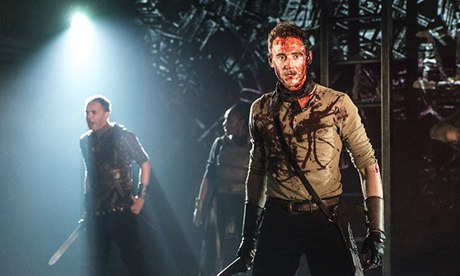
The early 20th-century conductor Sir Thomas Beecham was not a big fan of the radio. He thought that if people could listen to concerts relayed in their own home, they would be reluctant to visit concert halls. He chided the "wireless authorities" for doing "devilish work".
I thought about Sir Thomas – who no doubt would be delighted to learn that the devilish Radio 3 hasn't killed off the live concert – last week when Stephen Wood, executive director of the Stephen Joseph theatre in Scarborough, was reported in the Stage as taking issue with NT Live, which screens productions live to venues across the country and the world.
Upcoming productions include the Donmar's sellout Coriolanus with Tom Hiddleston. In a single evening, Coriolanus could stream to more people than it will play during its entire run in the 250-seater venue. Wood is concerned that these kind of broadcasts will become a substitute for actual theatregoing, saying: "We must be careful that we don't arrive at a situation where this type of thing is what people's only experience of live theatre really is."
Wood's comments echo those of Michael Kaiser of the Kennedy Centre in Washington, who in a blog last year raised the spectre that digital downloads and screenings are threatening American regional theatre. He asked whether the baby-boom generation could be "the last to routinely attend live, fully professional performances" and suggested that the allure of being able to broadcast to huge numbers could make organisations who are using digital technology risk-adverse and lead to the collapse of regional theatre. Why will people go out to the theatre, particularly at a time of rising costs, he asks, when they can stay home and download or go to a local cinema? Probably for exactly the same reasons why live gigs are flourishing. Downloading your favourite band's tracks is not the same as seeing them live.
In both cases, Wood and Kaiser appear a little like King Canutes trying to fruitlessly hold back the waves. In both cases they appear to see digital as a threat to live theatregoing. Perhaps assuming that the 60,000 people who attended live screenings of David Tennant's Richard II in cinemas are incapable of understanding that it's not the same as actually seeing a live performance at the RST or the Barbican. I know perfectly well that fresh salmon and smoked salmon don't taste the same but that doesn't stop me from wanting to sample both.
Not everyone has a theatre on their doorstep or indeed access to it. Many of the thousands of British schoolchildren who last November enjoyed a classroom streaming of Richard II and a live discussion with Tennant and Greg Doran would not otherwise have had the opportunity to see the show at all.
But that doesn't mean that their appetite won't be whetted to go to their local theatre and see a different show as a result. Early Nesta research about NT Live found that it was more likely, not less likely to make people go to the theatre, and people who go to the theatre are more likely to go and see more theatre.
More forward-thinking theatres understand this. They are not in competition with each other for audiences, and anything we can do to encourage theatregoing and make it a habit can only be good in what ever form it is distributed. Surely we should be celebrating the fact that the NT reached two million more people through screenings, not getting anxious about it? If anything it should be a spur to make theatres and companies all over the country wonder how might they might use of digital in interesting ways. Many already are. Some are looking at different ways of storytelling in projects such as Unlimited's new initiative, Uneditions. I don't think this is an issue that necessarily pits big against small, or London against the regions. It is more about open-mindedness and a willingness to be bold.
It's certainly not about ditching the way that theatre has been toured and delivered over hundreds of years, but rather about seeing the artistic possibilities of digital platforms and extending reach, capacity and audiences. There are plenty, from Pilot to National Theatre Wales and Hampstead, who are already doing just that. If they can do it then so can the Stephen Joseph, and others too.

